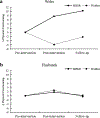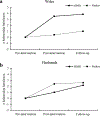Mindfulnes-Based Stress Reduction for Older Couples with Metabolic Syndrome: a Pilot Randomized Controlled Trial
- PMID: 33343762
- PMCID: PMC7748069
- DOI: 10.1007/s12671-019-01301-9
Mindfulnes-Based Stress Reduction for Older Couples with Metabolic Syndrome: a Pilot Randomized Controlled Trial
Abstract
Objective: We examined the feasibility and explored the physical, psychological, relational, and biological effects of Mindfulness-Based Stress Reduction (MBSR), an 8-week standardized mindfulness program, involving older married couples (60 years or older) with metabolic syndrome (one or both partners had metabolic syndrome). We also explored gender differences.
Methods: A pilot randomized controlled trial (RCT) compared MBSR to a Wait List Control (WLC) arm at baseline, post-intervention, and 3-month follow-up clinic visits. Twenty-two spouses (11 couples) self-reported stress, physical and mental functioning, mindfulness, and relationship satisfaction at each time point. Fasting glucose, cholesterol, triglycerides, blood pressure, weight, and waist circumference were measured. MBSR couples answered questions about partner influences on participation, adherence, and practice at the post-intervention visit.
Results: In terms of adherence to MBSR sessions, four of the six couples attended all 10 sessions; one couple attended 7; and one wife attended 6 and her husband attended 5 sessions. In terms of efficacy, there were no significant intervention effects; however, there were significant gender by intervention effects. Pre- to post-intervention, MBSR wives displayed greater increases in physical functioning (β = 1.18, t(36) = 3.17, p = .003) and relationship satisfaction (β = .72, t(36) = 2.81, p = .007) than WLC wives. Effects for husbands were not significant. Qualitatively, participants reported encouragement and increased relationship closeness.
Conclusions: Engaging in MBSR as a couple to address symptoms of metabolic syndrome was well-received and feasible. Preliminary effects suggest more benefits for wives than husbands in terms of physical functioning and relational well-being.
Keywords: MBSR; couples; metabolic syndrome.
Figures


Similar articles
-
Mindfulness-Based Stress Reduction in Older Adults at Risk for Coronary Artery Disease: A Pilot Randomized Trial.Clin Gerontol. 2022 Mar-Apr;45(2):272-286. doi: 10.1080/07317115.2021.1887421. Epub 2021 Mar 15. Clin Gerontol. 2022. PMID: 33719899 Clinical Trial.
-
Mindfulness-based stress reduction for the treatment of irritable bowel syndrome symptoms: a randomized wait-list controlled trial.Int J Behav Med. 2013 Sep;20(3):385-96. doi: 10.1007/s12529-012-9241-6. Int J Behav Med. 2013. PMID: 22618308 Clinical Trial.
-
A pilot randomised trial comparing a mindfulness-based stress reduction course, a locally-developed stress reduction intervention and a waiting list control group in a real-life municipal health care setting.BMC Public Health. 2020 Mar 30;20(1):409. doi: 10.1186/s12889-020-08470-6. BMC Public Health. 2020. PMID: 32228533 Free PMC article. Clinical Trial.
-
Mindfulness-based stress reduction added to care as usual for lung cancer patients and/or their partners: A multicentre randomized controlled trial.Psychooncology. 2017 Dec;26(12):2118-2126. doi: 10.1002/pon.4430. Epub 2017 Apr 26. Psychooncology. 2017. PMID: 28337821 Clinical Trial.
-
Mindfulness and bodily distress.Dan Med J. 2012 Nov;59(11):B4547. Dan Med J. 2012. PMID: 23171754 Review.
Cited by
-
Comprehensive Review of Chronic Stress Pathways and the Efficacy of Behavioral Stress Reduction Programs (BSRPs) in Managing Diseases.Int J Environ Res Public Health. 2024 Aug 16;21(8):1077. doi: 10.3390/ijerph21081077. Int J Environ Res Public Health. 2024. PMID: 39200687 Free PMC article. Review.
-
Meditation for the primary and secondary prevention of cardiovascular disease.Cochrane Database Syst Rev. 2024 Feb 15;2(2):CD013358. doi: 10.1002/14651858.CD013358.pub2. Cochrane Database Syst Rev. 2024. PMID: 38358047 Free PMC article.
-
Effects of Static Meditation Practice on Blood Lipid Levels: A Systematic Review and Meta-Analysis.Healthcare (Basel). 2024 Mar 14;12(6):655. doi: 10.3390/healthcare12060655. Healthcare (Basel). 2024. PMID: 38540618 Free PMC article. Review.
-
When Harry Met Sally: Older Adult Spouses' First Encounter Reminiscing and Well-Being.Gerontologist. 2022 Nov 30;62(10):1486-1495. doi: 10.1093/geront/gnac053. Gerontologist. 2022. PMID: 35429275 Free PMC article.
References
-
- 2017 Older Americans Profile. Retrieved December, 10, 2019 from the Adminstration for Community Living website: https://acl.gov/sites/default/files/Aging%20and%20Disability%20in%20Amer...
-
- Alexander CM, Landsman PB, Teutsch SM, & Haffner SM (2003). NCEP-defined Metabolic Syndrome, Diabetes, and prevalence of Coronary Heart Disease among NHANES III participants age 50 years and older. Diabetes, 52 (5), 1210–1214. - PubMed
-
- Baer RA, Smith GT, & Allen KB (2004). Assessment of mindfulness by self-report the Kentucky inventory of mindfulness skills. Assessment, 11(3), 191–206. - PubMed
-
- Birnie K, Garland SN, & Carlson LE (2010). Psychological benefits for cancer patients and their partners participating in mindfulness-based stress reduction (MBSR). Psycho-Oncology, 19(9), 1004–1009. - PubMed
Grants and funding
LinkOut - more resources
Full Text Sources
